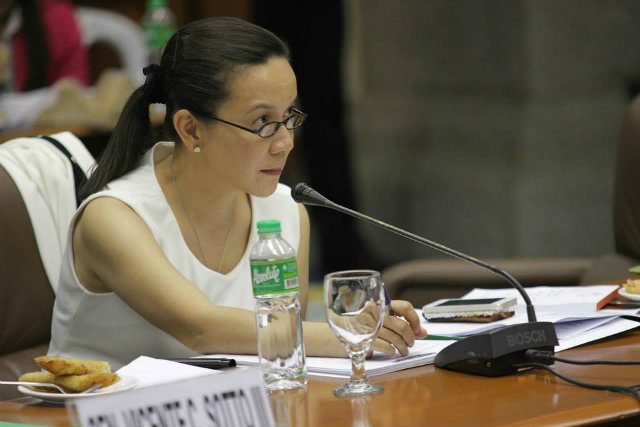SUMMARY
This is AI generated summarization, which may have errors. For context, always refer to the full article.

The Comelec’s 2nd Division cancelled Grace Poe’s certificate of candidacy (COC) for president because it concluded that she falsely declared that she had been a resident of the Philippines for 10 years and 11 months. (READ: Can Comelec ‘disqualify’ Grace Poe?)
According to the division’s 34-page decision, Poe in 2013 declared in her COC for senator that she was a resident of the Philippines for 6 years and 6 months, counted backwards from the May 13, 2013, elections.
(The Comelec’s First Division also later ruled against Poe. Read the author’s take on it: EXPLAINER: 3 curious points in 1st division’s ruling vs Poe)
The division then determined the period between the May 13, 2013, elections and the upcoming May 9, 2016, elections, and added it to the 6 years and 6 months she previously declared.
With that, it concluded that Grace Poe’s residence in the Philippines is at most “9 years and 6 months” – a period which not only falls short of the minimum residence requirement to become president, but contradicts her declaration in her 2016 COC, thus putting her in bad faith.
That method employed by the 2nd division was very simplistic, almost elementary. I cringed, however, at the thought of a top presidential aspirant being kicked out of the electoral race using mathematics. Yes, mathematics!
High Court has a different idea of ‘residency.’
The Supreme Court, in resolving issues of residence or domicile, adopts 3 criteria:
- residence or bodily presence in the Philippines
- intention to remain in the Philippines
- intention to abandon foreign domicile
These are usually shown through testimonies of physical presence, frequency of return to the locality, travel documents, or even land or property titles showing some form of attachment to a particular locality.
On this note, I find it bizarre that there was absolutely no effort on the part of the Comelec Second Division to discuss these indispensable criteria in relation to Grace Poe’s case. Instead, it conveniently resorted to just her COCs.

Certificates of candidacy are not a reliable basis for determining qualifications.
The decision was inaccurately premised on the assumption that candidates are required to state “true and correct” facts in their certificates of candidacy. A closer examination of the form would show that what is actually required of them is to state true and correct facts “to the best of [their] knowledge.”
We must be careful with this distinction, because those two are different. The candidate’s opinion or perception of facts may not necessarily be the same with the facts themselves. In fact, opinions are generally inadmissible under our rules on evidence. It is in this sense that we cannot depend on the COCs on their face value.
This distinction is particularly significant when it comes to the issue of residence.
A layman may understand “residence” in its common sense, meaning bodily or physical presence in a particular locality. Under our election laws, however, mere emotional connection to a locality would already suffice. This is why many candidates who are not well-versed in the intricacies of election law commit mistakes in answering this question in the COC.
Thus, in the landmark case of Imelda Marcos vs. COMELEC (GR Number 119976, September 18, 1995), the Supreme Court rejected the use of her erroneous COC declaration in resolving issues pertaining to her residence. In that case, Imelda mistakenly placed 7 months as her period of residence in her COC for member of the House of Representatives when the minimum requirement for the position is one year.
SC tells us to go back to evidence, not the COC.
When such erroneous declaration was used to seek the cancellation of Marcos’ COC, the Court ruled, “[i]t is the fact of residence, not a statement in a certificate of candidacy which ought to be decisive in determining whether or not and individual has satisfied the constitution’s residency qualification requirement.”
In other words, the Supreme Court tells us not to rely on the COC and to go back to the evidence! After all, the duty of the Comelec in this case is not to determine what Grace Poe thinks about her residence, but whether she has resided long enough in the Philippines to qualify.
Despite this, the 2nd division went the opposite way. What was even more bizarre, Grace Poe’s evidence proving her 10-year residence was not even touched or discussed in the decision. It instead blindly relied on that evidentiary rule in civil procedure on “declarations against interest,” which is likewise amiss.
The word “interest” in that rule has been interpreted to exclusively refer to “pecuniary, proprietary, moral or even penal [interests].” Its limited scope precludes its unwarranted application to election cases which are vested with public interest, above anyone’s personal interest.
In Sabili v. COMELEC (GR Number 193261, April 24, 2012), for example, the use of that rule in a Petition to Deny Due Course case was rejected for being “inaccurate and irrelevant.” The High Court explained that the doctrine “pertains only to the admissibility of, not the weight accorded to, testimonial evidence.”
Thus, the rule on “declaration against interest,” assuming that it is applicable, only allows at most the 2013 COC of Grace Poe to be admitted, but does not automatically accord it any weight as evidence. This brings us back to the discussion on whether COCs can be depended upon.
All told, while there’s wisdom in the statutory authority of the Comelec to remove a candidate before the elections, it is so potent that it can be very dangerous if misused.
Using this power, the Comelec can theoretically make someone president without an election. That to me is not only subversive to our nation’s democratic ideals. It also deprives the people of choice, which is fundamentally in derogation of their collective right to choose.
While I do believe that the issues on Grace Poe’s residency and citizenship status have to be resolved with certainty, the cancellation of her COC at this stage should only be done on solid legal grounds and in a manner that is clear and convincing to the electorate. – Rappler.com
Emil Marañon is an election lawyer who served as chief of staff of recently retired Comelec Chairman Sixto Brillantes Jr. He is currently studying Human Rights, Conflict and Justice at SOAS, University of London, as a Chevening scholar.
Add a comment
How does this make you feel?
There are no comments yet. Add your comment to start the conversation.